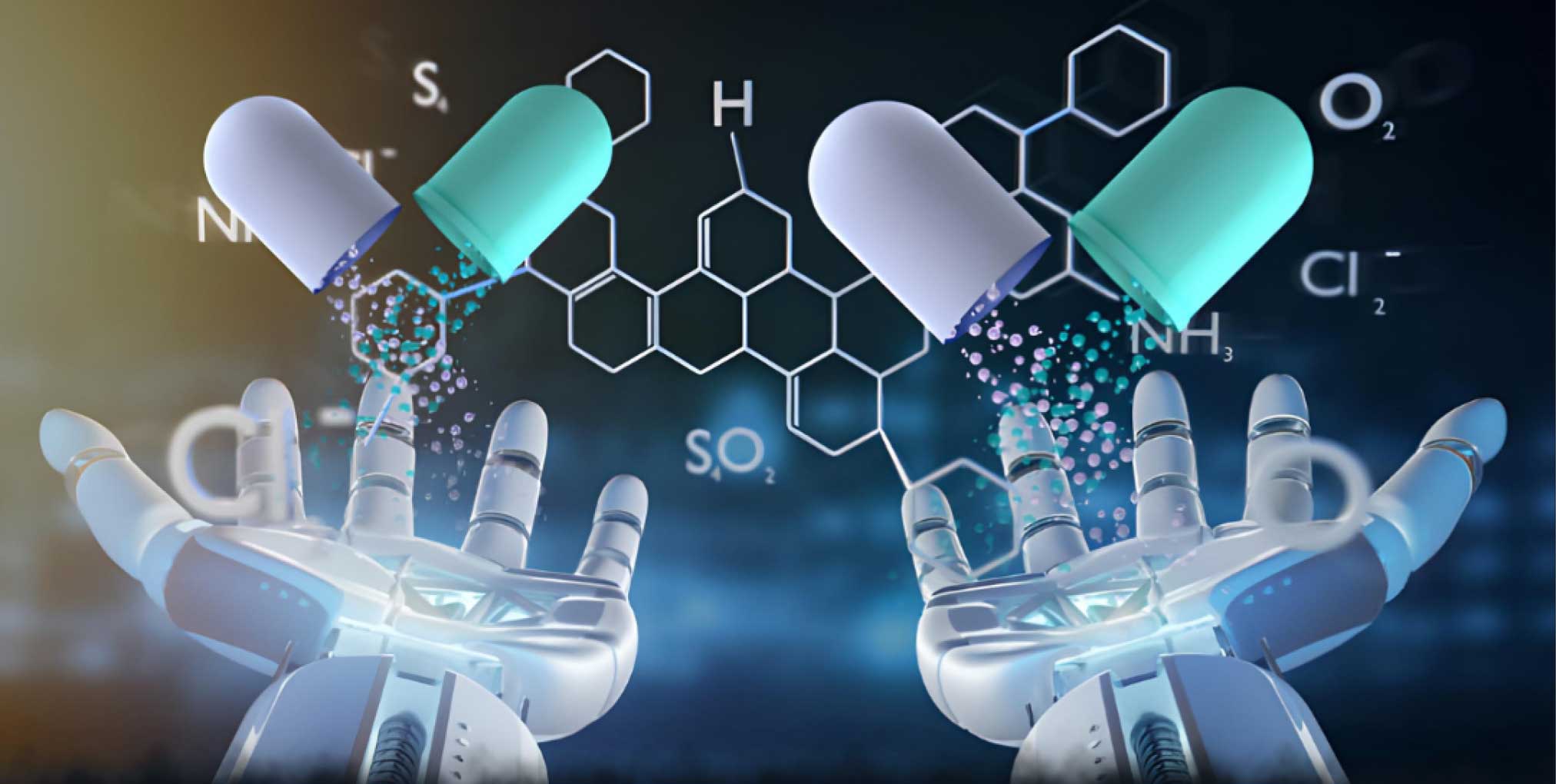

June 10, 2024
When businesses consider generative AI, they often think of automated chatbots or code-writing bots as the primary applications. However, one of the most exciting use cases of generative AI is in research! This presents an immense opportunity for pharmaceutical companies to avail this cutting-edge technology.
In this blog, we will explore the top five generative AI use cases for pharmaceuticals highlighting its transformative impact and the future it promises. Generative AI is very helpful for researchers and pharmacists, capable of sifting through large datasets to identify patterns that would take human analysts significantly longer to identify. This accelerates pharmaceutical research and drug development, leading to the creation of new, life-saving drugs.
As we discussed the Gen AI use cases in healthcare in our previous blogs, it is also transforming nearly all aspects of the pharmaceutical industry, revamping the way companies operate and potentially generating billions of dollars in value.
The McKinsey Global Institute (MGI) has estimated that the technology could generate $60 billion to $110 billion a year in economic value for the pharma and medical-product industries. This is largely because it can boost productivity by accelerating the process of identifying compounds for possible new drugs, speeding their development and approval, and improving the way they are marketed.

The first question that pops up in everyone’s head is What is Gen AI? Generative AI, or Gen AI, refers to AI algorithms that can generate new data, designs, or content based on existing information. Unlike traditional AI, which focuses on analyzing data, generative AI creates new possibilities, making it a game-changer in pharmaceuticals. From designing new drugs to personalizing treatments, generative AI opens up a world of opportunities in medicine.

One of the most intriguing generative AI use cases for pharmaceuticals is in drug discovery and design. Traditional methods of finding potential drug compounds are often slow and expensive. Here comes Gen AI in Pharma, which speeds up this process by quickly going through vast datasets to pinpoint promising candidates. This efficiency accelerates the discovery phase and reduces the costs associated with early-stage research.
Gen AI in Drug Discovery employs advanced algorithms to simulate and analyze millions of chemical structures, identifying those likely to interact effectively with biological targets.
These advancements allow researchers to focus on the most promising compounds, reducing the time needed to advance new drugs to clinical trials.
Another fascinating application of Gen AI is predicting molecular structures that could combat specific diseases. Gen AI use cases in Pharma include generating new molecular structures and predicting how they will react with other compounds, making the drug design process far more efficient.
By simulating these interactions, generative AI helps in developing drugs that are both potent and safe. Generative models can forecast the binding affinity of molecules to target proteins, a critical step in drug design.
This predictive analytics feature helps pharmaceutical companies in designing molecules with the highest success potential, minimizing the risk of expensive failures later in development.

Personalized medicine is another area where generative AI shines brightly. By analyzing genetic information and patient data, generative AI helps create treatments that are more effective for individual patients. This is part of the broader trend towards precision medicine, where treatments are customized based on unique patient characteristics.
Gen AI in Pharma can crunch data from genomic, proteomic, and clinical sources to develop personalized treatment plans. This means treatments can be customized to each patient’s specific needs and genetic makeup, ensuring effectiveness and reducing the chances of adverse reactions.
Generative AI also excels in predicting how patients will respond to medications. This capability helps minimize adverse effects and optimize therapeutic outcomes, making Gen AI use cases in Pharma essential for advancing personalized healthcare.
By analyzing patient data, generative AI can detect correlations that might not be obvious through traditional analysis. This process enables healthcare providers to predict patient responses to drugs, selecting the most effective treatments and dosages for each individual.

Drug repurposing—discovering new uses for existing drugs is another exciting generative AI use case for pharmaceuticals. By scouring extensive medical databases, generative AI can identify new potential applications for drugs already on the market, saving both time and resources in drug development.
AI models can analyze the chemical properties and biological effects of existing drugs, pinpointing new disease targets these drugs might effectively treat. This feature is especially valuable for quickly addressing emerging health threats or finding new treatments for diseases with limited options.
Gen AI in Pharma allows companies to discover alternative uses for drugs faster, enhancing development efficiency and reducing costs. This speeds up the time-to-market for treatments but also maximizes the utility of existing drugs.
Drug repurposing with generative AI can drastically cut the time and cost associated with drug development. It helps in the early-stage research needed for new compounds. This ensures the delivery of effective treatments and can lead to innovative uses of existing drugs, providing new solutions for unmet medical needs.

Generative AI use cases for pharmaceuticals extend to optimizing clinical trials. AI development services help design more effective trial protocols. It can predict outcomes and identify potential issues before trials start. This identification reduces the time and cost of bringing a new drug to market.
Moreover, it leads to various trial scenarios, helping researchers design studies that are more likely to show meaningful results. By predicting potential challenges and adjusting protocols accordingly, generative AI ensures clinical trials are more efficient and cost-effective.
Generative AI also boosts patient recruitment and retention by analyzing patient data to find suitable candidates for clinical trials. This ensures trials have the right participants, enhancing the reliability and speed of the trial process.
Recruiting the right patients for clinical trials is a major challenge but it is not a hassle since AI can analyze large datasets to identify individuals who meet criteria. It makes them benefit from the experimental treatment. This targeted approach increases the likelihood of trial success and ensures participants remain engaged throughout the study.

In drug manufacturing, generative AI is a game-changer for improving production processes.
It can pinpoint inefficiencies and suggest improvements which further lead to more cost-effective and reliable production.
Another way is the optimization of various aspects of the manufacturing process, from raw material sourcing to production line efficiency. Identifying bottlenecks and predicting equipment failures also helps pharmaceutical companies maintain continuous production and reduce downtime.
Quality control is another critical area where Gen AI in Pharma makes a significant impact.
It can predict and detect potential quality issues in real-time, ensuring that produced drugs meet the highest safety and efficacy standards.
By continuously monitoring production data, generative AI can spot deviations from quality standards and suggest corrective actions. This proactive approach to quality assurance ensures pharmaceutical products are consistently safe and effective, protecting both patients and manufacturers.
If you are looking to integrate AI technology into your pharmaceutical business, Xeven Solutions is here to help. As a leading AI development and solutions company, we have the expertise and experience to assist you in implementing AI tools and processes that can enhance efficiency, improve accuracy, and drive innovation within your industry. With Xeven Solutions as your partner, you can stay ahead of the competition and transform your pharmaceutical business with AI.
In conclusion, the top 5 generative AI use cases for pharmaceuticals show the transformative potential of this technology in the industry. From drug discovery to personalized medicine, drug repurposing, optimizing clinical trials, and enhancing drug manufacturing, generative AI is driving innovation and efficiency.
As AI development services continue to evolve, the future of pharmaceuticals looks brighter, more efficient, and more personalized, due to the remarkable capabilities of generative AI. The impact of Gen AI in Pharma will only grow, offering new hope and better outcomes for patients worldwide.